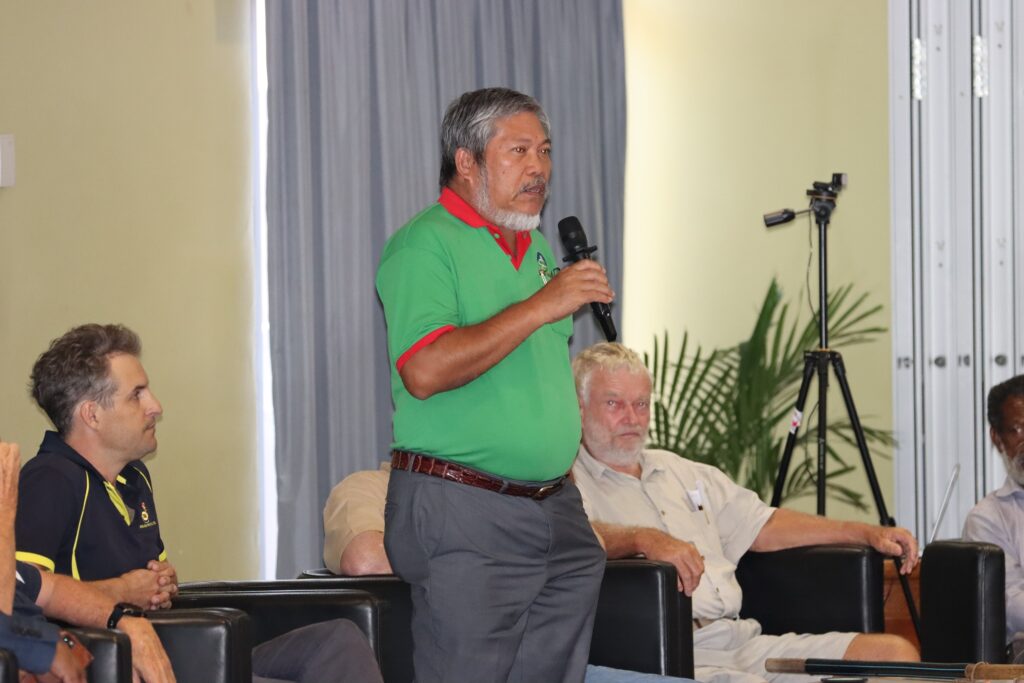Lae, Wednesday, April 9, 2025 – David Duran, General Manager of Rumion Farm in the Markham Valley of Morobe, has voiced strong support for the Marape Government’s agricultural agenda while highlighting persistent obstacles that are hampering the growth of domestic agribusinesses: security and theft, power supply and foreign exchange.
Delivering his remarks at the National Agriculture Industry Public-Private Sector Partnership Conference in Lae, Mr Duran said Rumion is ready to scale up grain production, expand its plantations, and contribute to national food security—but called for urgent attention to the structural issues crippling productivity.
“We see the potential, but it’s not easy doing business in agriculture in PNG,” he told the audience. “Law and order is one of our biggest challenges, and it’s increasing the cost of doing business.”
About Rumion
Rumion is a vertically integrated agribusiness operating a feed mill, livestock farms, and crop plantations, including a 500-hectare corn plantation. While smaller in scale compared to major players such as Mainland Holdings and GFI, Rumion is focused on developing a sustainable model for domestic feed production and livestock integration.
“We have our own feed mill—quite small compared to what GFI (Goodman Fielder International) and Mainland Holdings operate—but it plays a critical role in reducing reliance on imported grains,” Duran said.

Security and Theft: A Growing Cost
One of the most pressing issues facing the company is theft—particularly livestock theft on Rumion’s cattle ranches.
“We’ve lost a lot of cattle stock to theft,” Duran revealed. “Guarding a 40-kilometre perimeter of ranch land is enormous. Hiring guards or deploying service providers is five times more expensive than the value of the livestock we’re trying to protect.”
He said the company is often forced to write off the losses, which significantly impacts operational costs and profitability.
Energy and Infrastructure
Power supply remains another major hurdle. Rumion runs entirely on generators, contributing to soaring operational expenses.
“Power is our second-biggest cost, after feedstock,” said Duran. “We’re now exploring solar power as a means of reducing our costs. We hope to shift in the coming years.”
This sentiment underscores the importance of rural electrification and renewable energy access as critical enablers for agribusiness investment.
Corn vs. Imports: A Price War
Duran spoke passionately about the need for PNG to produce its own grain—especially corn—as part of the revival of the livestock industry. He acknowledged recent discussions led by Livestock Development Corporation (LDC) Managing Director Terry Koim, which brought attention to the vital role of grain in animal feed.
“We’re happy to say that Rumion is ready to get into expanding our plantation area, especially if we can partner with more landowners,” Duran said. “We’ve already had our corn tested by GFI and Mainland Holdings—they have no issues with the quality, but our price is a little higher than imported grain.”
This pricing challenge is a result of the lack of government subsidies, import duties on machinery and inputs, and competition with heavily subsidised foreign grain.
“Imported grain is cheaper because those countries subsidise their producers. We, on the other hand, are paying full duties and facing high input costs,” he explained.
Foreign Exchange Woes
PNG’s foreign exchange (forex) shortage further complicates the matter, making it difficult for agribusinesses to import machinery or raw materials.
“There is more demand for foreign exchange to pay for imports than there is inflow. That’s why it’s critical we start producing more grain domestically—to ease that burden.”
He noted that local production of corn and other feed components would not only stabilise the feed supply chain but also reduce forex outflows and improve national food security.
Looking Ahead
Despite the challenges, Duran reaffirmed Rumion’s commitment to PNG’s agricultural future. He said the company is exploring new partnerships and innovations to boost its impact.
“We believe in the potential of this country. But we need clear policies, tax relief, reliable infrastructure, and improved law and order to keep investing.”
He concluded by calling on government leaders and stakeholders to recognise the real costs of operating agribusiness in PNG—and to act in partnership to overcome them.
The conference in Lae brought together over 300 delegates from across PNG, uniting public officials, business leaders, and development partners in an effort to chart a sustainable path for agriculture in the next 50 years of nationhood.
ENDS